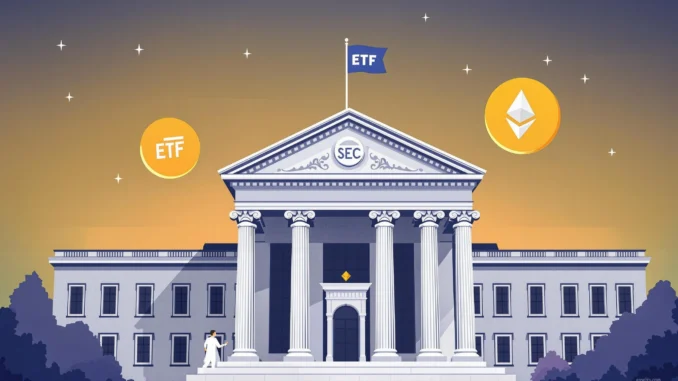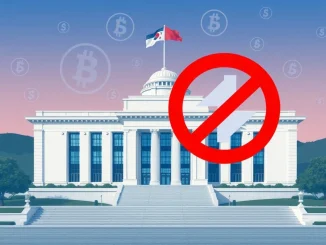
Exciting news for Ethereum enthusiasts and ETF investors! The world of crypto ETFs is buzzing as the U.S. Securities and Exchange Commission (SEC) has officially acknowledged receiving a crucial review request. This isn’t just any request; it’s from 21Shares, a prominent ETF issuer, seeking the SEC’s nod to incorporate staking into their spot Ethereum ETF. This move could potentially revolutionize how investors engage with ETH ETFs and unlock new avenues for yield generation within the crypto space.
Why is SEC Review of Ethereum ETF Staking a Big Deal?
The SEC’s acknowledgment of 21Shares’ 19b-4 filing is a significant step forward in the evolution of cryptocurrency investment products in the United States. But why is this SEC ETF review so noteworthy? Let’s break it down:
- First of its kind: If approved, this would be the first spot Ethereum ETF in the U.S. to offer staking rewards directly to its investors. Currently, spot Bitcoin ETFs are available, but staking mechanisms are different and not directly integrated within those products.
- Enhanced investor appeal: Staking, in simple terms, is like earning interest on your crypto holdings. By adding staking to an Ethereum ETF, 21Shares is aiming to make their product more attractive by offering potential passive income in addition to price appreciation of Ethereum.
- Regulatory precedent: The SEC’s decision on this matter will set a precedent for future crypto ETF applications, particularly those involving staking. It could signal a more accommodating stance from the regulator towards innovative crypto financial products.
Think of it like this: currently, owning a spot Ethereum ETF gives you exposure to the price movements of Ethereum. Adding staking is like adding a dividend payout to that investment. It’s a way to potentially earn more from your investment beyond just price appreciation.
What is Ethereum Staking and How Does it Work in an ETF?
For those new to the crypto world, let’s demystify Ethereum ETF staking. Ethereum, the second-largest cryptocurrency by market cap, transitioned to a Proof-of-Stake (PoS) consensus mechanism in 2022. This means that instead of energy-intensive mining, Ethereum’s network is secured by users who “stake” their ETH.
Here’s a simplified explanation:
- Staking ETH: Holders of ETH can lock up a portion of their holdings (stake) to support the Ethereum network.
- Validating Transactions: These staked ETH are used to validate transactions on the blockchain and maintain network security.
- Earning Rewards: In return for staking, participants earn rewards in the form of additional ETH. This is the “interest” in the crypto world.
Now, how would this work within a 21Shares ETF? If the SEC approves, 21Shares would likely operate staking nodes or partner with staking providers to stake a portion of the ETH held within the ETF. The staking rewards generated would then be distributed to ETF shareholders, potentially as increased ETF value or direct payouts (details would be outlined in the ETF prospectus).
The Potential Benefits of a Spot ETH ETF with Staking
The introduction of a spot Crypto ETF with staking capabilities could unlock a range of benefits for investors and the broader crypto ecosystem:
- Enhanced Returns: Staking rewards can significantly boost the overall returns for ETF investors, making Ethereum ETFs more competitive compared to traditional investment products.
- Passive Income Generation: Investors can earn passive income from their ETH holdings without needing to actively manage staking processes themselves. This is particularly appealing for those who find the technical aspects of staking daunting.
- Increased Institutional Adoption: The availability of staking in a regulated ETF format could attract more institutional investors who are looking for yield-generating crypto assets within a familiar and compliant structure.
- Mainstream Accessibility: ETFs make crypto investments accessible to a wider range of investors through traditional brokerage accounts. Adding staking further simplifies the process of earning rewards on crypto assets for the average investor.
Consider this scenario: an investor wants exposure to Ethereum and is also interested in staking but finds setting up a crypto wallet and navigating staking platforms complex. A spot Ethereum ETF with staking solves this problem by offering both exposure and staking rewards within a single, easy-to-access investment vehicle.
Challenges and Considerations for SEC Approval
While the prospect of a staking-enabled Spot ETH ETF is exciting, there are hurdles to overcome, particularly concerning regulatory approval from the SEC. The SEC has been cautious about crypto products, and staking adds another layer of complexity. Some potential challenges include:
- Regulatory Scrutiny: The SEC will likely scrutinize the staking mechanism, security protocols, and custody arrangements to ensure investor protection. They will want to be certain that the staking process is transparent and secure.
- Custodial Risks: Safely managing and staking large amounts of ETH within an ETF structure requires robust custodial solutions. The SEC will need to be convinced that these solutions are in place to mitigate risks.
- Tax Implications: The tax treatment of staking rewards within an ETF framework will need to be clarified. This is a crucial aspect for investors and ETF providers alike.
- Market Volatility: The inherent volatility of cryptocurrency markets, combined with staking rewards, needs to be carefully considered in terms of risk disclosures and investor education.
The SEC ETF review process can be lengthy and unpredictable. There’s no guarantee of approval, and even if approved, the timeline remains uncertain. However, the fact that the SEC has acknowledged the 19b-4 filing is a positive indication that they are actively considering this innovative product.
What’s Next for the 21Shares Ethereum ETF and the Crypto Market?
The acknowledgment of 21Shares’ request marks the beginning of a potentially pivotal period for Crypto ETFs. Here’s what to watch out for:
- SEC Deliberation: The SEC will now begin its review process, which involves public comments, expert consultations, and internal analysis. This process could take several months.
- Competitor Response: Other ETF issuers are likely watching this development closely. If 21Shares gains approval, we could see a wave of similar filings for staking-enabled Ethereum ETFs.
- Market Impact: Positive news regarding the approval could boost investor sentiment towards Ethereum and the broader crypto market. Conversely, rejection could lead to disappointment and short-term market corrections.
- Broader Crypto Regulation: This decision could provide insights into the SEC’s evolving stance on crypto regulation and its willingness to embrace innovative crypto financial products.
Actionable Insights for Crypto Investors
While we await the outcome of the SEC review, here are some actionable insights for crypto investors:
- Stay Informed: Keep track of news and developments related to the 21Shares Ethereum ETF and the SEC’s decision. Reputable crypto news sources and regulatory filings are good places to monitor.
- Educate Yourself on Staking: Understand the basics of Ethereum staking, its potential benefits, and associated risks. This knowledge will help you assess the value proposition of a staking-enabled ETF.
- Diversify Your Portfolio: As with any investment, diversification is key. Consider how a staking-enabled Ethereum ETF fits into your overall investment strategy and risk tolerance.
- Consult a Financial Advisor: If you are unsure about the suitability of crypto ETFs or staking for your investment goals, seek advice from a qualified financial advisor.
Conclusion: A Groundbreaking Step for Ethereum ETFs?
The SEC acknowledging 21Shares’ request to add staking to their spot Ethereum ETF is undoubtedly a groundbreaking development. It signals a potential shift towards more sophisticated and yield-generating crypto investment products in the U.S. While the path to approval may still have uncertainties, the prospect of a staking-enabled Ethereum ETF is incredibly exciting for the crypto community and could pave the way for greater mainstream adoption of digital assets. Keep watching this space – the future of crypto ETFs might just be getting a whole lot more rewarding!



